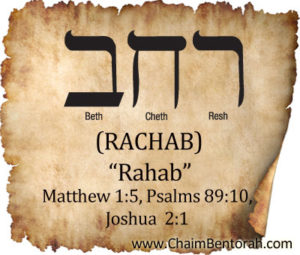HEBREW WORD STUDY – RAHAB – RACHAB רחב
Matthew 1:5: “ And Salmon begat Boaz of Rachab; and Booz begat Obed of Ruth, and Obed begat Jesse;”
Psalms 89:10: “Thou hast broken Rahab in pieces, as one that is slain; thou hast scattered thine enemies with thy strong arm.”
Joshua 2:1: “ And Joshua the son of Nun sent out of Shittim two men to spy secretly, saying, Go view the land, even Jericho. And they went, and came into a harlot’s house, named Rahab, and lodged there.”
 I would like to share with you a mystery which I have no idea how to resolve. However, it does illustrate a very important point that I will expand on in my live Tuesday evening class offered to subscribers to our Access site.
I would like to share with you a mystery which I have no idea how to resolve. However, it does illustrate a very important point that I will expand on in my live Tuesday evening class offered to subscribers to our Access site.
The internet has a number of blogs and sites that discuss the Rahab of Matthew 1:5 saying she is not the Rahab of Joshua 2 and thus not the ancestor of Jesus. One of the key points that are used to show Rachab of Matthew is not the Rahab of Joshua is that they are different names. It should be obvious to any reader. Some modern translators do say Rahab but the King James version says Rachab, Joshua says Rahab.
In Psalms, you find God has broken Rahab in pieces and killed her. Of course that his not the Rahab we all know and love and indeed it is not. I have search through many resources including Judaic resources and I have not found anyone who will address the fact that in the Hebrew the name Rahab is spelled Resh Cheth Beth which is pronounced Rachab as the King James Version pronounces it. In fact, the Aramaic Bible spells it exactly this way in the Aramaic Resh Cheth Beth. It is correctly pronounced Rachab (hard h sound like a k). Rahab and Rachab are two different words. Rahab means arrogance and is a metaphoric name for Egypt as it is used in the Psalms. It is also the name of a sea monster or in Jewish mythology a demon. Rachab, on the other hand, means to open wide, to accept all, be without prejudice which might suggest that her occupation was not necessarily a prostitute as we think of a prostitute. In fact, the word zonah is used to describe her occupation. In its Semitic origins, the word ZNH would also suggest a hostess or one who feeds and meets the needs of travelers. The fact that her house was located on the wall of the city would suggest she ran a hostel or inn. If we go with the prostitute idea the fact that she had such a key location in the city and that the city officials only questioned her about the spies and did not push their way into the dwelling, the fact that her family did not live with her in the dwelling and that when she told the city officials a big lie, they believed her without question all suggest she was not a prostitute as we consider a prostitute. Our concept does not give these women such respect. Many commentators feel she was a sacred prostitute and even her name Rachab suggest it is a play on the goddess’s name Nechab which would make her a high priestess to the cult.
So why does everyone call her Rahab which is the name of a demon or sea monster? I have no idea. I was reading in the Talmud Magillah 14b that Rahab was fifty years old at this time. She was ten with the Exodus started so for forty years she heard the tales of these Hebrews who crossed the Red Sea and defeated the Amalekites. She grew up believing in Jehovah as the only God. If she was a sacred prostitute she was sold into that life by her parents and was a literal slave. If an innkeeper she would have spent her life hearing the stories from travelers about how God protected His people. It also tells us in the Talmud Magillah 15b that she was one of the four most beautiful women mentioned in the Bible and the Talmud also says she married Joshua and was the mother of Boaz. So those who deny that the Rahab of Matthew was not the Rahab of Joshua have only to look at Jewish tradition who deny Jesus as the Messiah.
My point to all this is that it seems Christians get hysterical over such trivial matters as whether Rahab in Matthew is the same as the one in Joshua. I mean either get some basic knowledge of Hebrew or go to Jewish literature. Are there not more important things God wants us to do? As far everyone calling Rachab, Rahab, it only proves my point that Hebrew is open to much flexibility. Apparently, it is alright to call a Hei like a Cheth in order to prevent some confusion about an identity, which is the only reason I found as to why Rachab is called Rahab.







Recent Comments